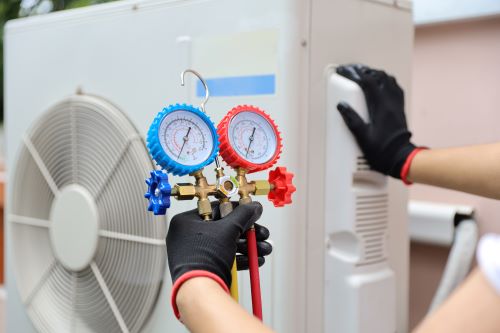There are plenty of times in life when one may be hesitant to recognize a problem, or when one may be quick to downplay just how important any given problem really is. If you own a home and use an air conditioning system to keep yourself and your family comfortable throughout our brutally hot and humid summer season, then you cannot afford to develop this type of mindset in regards to refrigerant leaks. Refrigerant leaks of any size are serious problems demanding prompt attention.
That being said, it begs a rather obvious question: how do you know if there even is a refrigerant leak in your system? It is not as if you are a professional HVAC technician—after all, if you were, you wouldn’t need us to tell you all this. Well, the “silver lining” here, though that may be testing the limits of the phrase, is that a refrigerant leak will typically give you some clear signs that something is wrong and that professional AC repairs in Chesterfield, MO are necessary.
First of All, What Is Refrigerant?
This is a logical starting point for most homeowners, we’d say. While you may be aware of the term “refrigerant,” you may not really understand what it is or what it does in your air conditioning system.
Basically, refrigerant acts as the heat transfer fluid that your air conditioner uses to cool your home down. An air conditioner does not “generate” “coolness,” the way that a heater may generate new heat through electrical resistance or the combustion of a fuel. Instead, it removes existing heat from the air in your home.
This is accomplished through the evaporation of refrigerant, as well as its condensing. The indoor coil of your air conditioner, or the “evaporator” coil, is the point at which (fittingly) refrigerant evaporates in the system. As it evaporates, it is able to pull heat out of the air surrounding that coil.
That hot refrigerant then travels out to the “condenser” coil in the outdoor unit. You guessed it; this is where refrigerant is condensed, which allows it to release its heat outdoors. The process continues until desired temperatures are met.
The Effects of a Low Refrigerant Charge
Your air conditioner does not consume refrigerant, so it is supposed to just be recycled through the system over and over, over the course of its lifespan. If you have a low refrigerant level, the system was either insufficiently charged, which is pretty rare but possible, or there is a leak—which is, unfortunately, not so rare. Because running and AC that is low on refrigerant can do irrevocable damage to the system, you need to pay attention to any and all warning signs. They may include the following.
- Ice on the evaporator coil/ice or frost on the refrigerant lines themselves.
- Short cycling, meaning that your system runs in short bursts.
- Decreased cooling output.
- Increased energy costs.
- Hissing sounds.
Contact Fresh Air Heating & Cooling if you suspect that you have a refrigerant leak in your air conditioning system.

